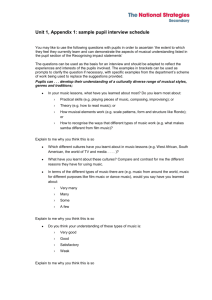Class 3: Curriculum Key Skills (Cycle B)
advertisement
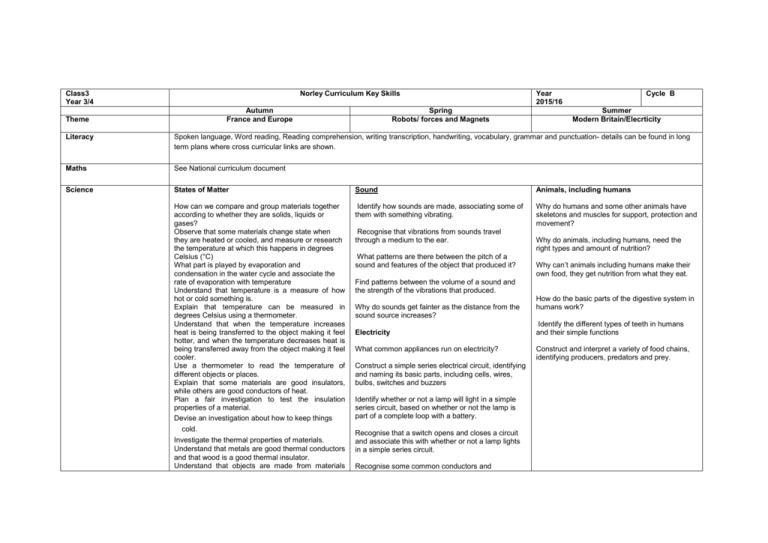
Class3 Year 3/4 Theme Norley Curriculum Key Skills Autumn France and Europe Spring Robots/ forces and Magnets Year 2015/16 Cycle B Summer Modern Britain/Elecrticity Literacy Spoken language, Word reading, Reading comprehension, writing transcription, handwriting, vocabulary, grammar and punctuation- details can be found in long term plans where cross curricular links are shown. Maths See National curriculum document Science States of Matter Sound Animals, including humans How can we compare and group materials together according to whether they are solids, liquids or gases? Observe that some materials change state when they are heated or cooled, and measure or research the temperature at which this happens in degrees Celsius (°C) What part is played by evaporation and condensation in the water cycle and associate the rate of evaporation with temperature Understand that temperature is a measure of how hot or cold something is. Explain that temperature can be measured in degrees Celsius using a thermometer. Understand that when the temperature increases heat is being transferred to the object making it feel hotter, and when the temperature decreases heat is being transferred away from the object making it feel cooler. Use a thermometer to read the temperature of different objects or places. Explain that some materials are good insulators, while others are good conductors of heat. Plan a fair investigation to test the insulation properties of a material. Devise an investigation about how to keep things cold. Investigate the thermal properties of materials. Understand that metals are good thermal conductors and that wood is a good thermal insulator. Understand that objects are made from materials Identify how sounds are made, associating some of them with something vibrating. Why do humans and some other animals have skeletons and muscles for support, protection and movement? Recognise that vibrations from sounds travel through a medium to the ear. What patterns are there between the pitch of a sound and features of the object that produced it? Why do animals, including humans, need the right types and amount of nutrition? Why can’t animals including humans make their own food, they get nutrition from what they eat. Find patterns between the volume of a sound and the strength of the vibrations that produced. Why do sounds get fainter as the distance from the sound source increases? Electricity What common appliances run on electricity? Construct a simple series electrical circuit, identifying and naming its basic parts, including cells, wires, bulbs, switches and buzzers Identify whether or not a lamp will light in a simple series circuit, based on whether or not the lamp is part of a complete loop with a battery. Recognise that a switch opens and closes a circuit and associate this with whether or not a lamp lights in a simple series circuit. Recognise some common conductors and How do the basic parts of the digestive system in humans work? Identify the different types of teeth in humans and their simple functions Construct and interpret a variety of food chains, identifying producers, predators and prey. that reflect their properties. Describe the differences between the properties of different materials and explain how these differences are used to classify substances. Use scientific terms to describe changes. insulators, and associate metals with being good conductors. Forces and magnets How do things move on different surfaces? Notice that some forces need contact between two objects, but magnetic forces can act at a distance Why do magnets attract or repel each other? Why do they attract some materials and not others? Compare and group together a variety of everyday materials on the basis of whether they are attracted to a magnet, and identify some magnetic materials. Describe magnets as having two poles and predict whether two magnets will attract or repel each other, depending on which poles are facing. Art Citizenship This term the focus will be on textiles, drawing and painting This term the focus will be on painting, collage and 3D art. This term the focus will be on collage, printing and 3D art This term the focus is on ‘New Beginnings’ This term the focus is on ‘Going for Goals’ This term the focus has been on and ‘Getting on and Falling Out’ and ‘Good to Me’. ‘Relationships’ and ‘Changes’. Computing Design and Technology Geography Understand geographical similarities and differences through the study of human and physical geography of a region in a European country Pupils will use geographical skills and fieldwork, maps, atlases, globes and digital/computer mapping to locate countries and describe features studied. Use the eight points of a compass, four and sixfigure grid references, symbols and key (including the use of Ordnance Survey maps) to build their knowledge of the United Kingdom and the wider world. History European Culture during and after the 2nd World War The History of Britain since 1945 Identify the position and significance of latitude, longitude, Equator, Northern Hemisphere, Southern Hemisphere, the Tropics of Cancer and Capricorn, Arctic and Antarctic Circle, the Prime/Greenwich Meridian and time zones (including day and night) Multicultural Britain A study over time tracing how several aspects of national history are reflected in the locality (this can go beyond 1066) A study of an aspect of history or a site dating from a period beyond 1066 that is significant in the locality. A significant turning point in British history, for example, the first railways or the Battle of Britain French Pupils will be taught to: Pupils will be taught to: Pupils will be taught to: Listen attentively to spoken language and show understanding by joining in and responding Broaden their vocabulary and develop their ability to understand new words that are introduced into familiar written material, including through using a dictionary Understand basic grammar appropriate to the language being studied, including (where relevant): feminine, masculine and neuter forms and the conjugation of high-frequency verbs; key features and patterns of the language; how to apply these, for instance, to build sentences; and how these differ from or are similar to English. Explore the patterns and sounds of language through songs and rhymes and link the spelling, sound and meaning of words Engage in conversations; ask and answer questions; express opinions and respond to those of others; seek clarification and help* Speak in sentences, using familiar vocabulary, phrases and basic language structures Develop accurate pronunciation and intonation so that others understand when they are reading aloud or using familiar words and phrases* Present ideas and information orally to a range of audiences* Read carefully and show understanding of words, phrases and simple writing Appreciate stories, songs, poems and rhymes in the language. Write phrases from memory, and adapt these to create new sentences, to express ideas clearly Describe people, places, things and actions orally* and in writing. Spring – My family Summer – Food and drink Autumn - Describing a monster Music Pupils will be taught to sing and play musically with increasing confidence and control. They should develop an understanding of musical composition, organising and manipulating ideas within musical structures and reproducing sounds from aural memory. Pupils should be taught to: play and perform in solo and ensemble contexts, using their voices and playing musical instruments with increasing accuracy, fluency, control and expression improvise and compose music for a range of purposes using the inter-related dimensions of music listen with attention to detail and recall sounds with increasing aural memory use and understand staff and other musical notations appreciate and understand a wide range of high-quality live and recorded music drawn from different traditions and from great composers and musicians develop an understanding of the history of music. Music relating to other cultures and dances associated with the music Pupils will be taught to sing and play musically with increasing confidence and control. They should develop an understanding of musical composition, organising and manipulating ideas within musical structures and reproducing sounds from aural memory. Pupils should be taught to: play and perform in solo and ensemble contexts, using their voices and playing musical instruments with increasing accuracy, fluency, control and expression improvise and compose music for a range of purposes using the inter-related dimensions of music listen with attention to detail and recall sounds with increasing aural memory use and understand staff and other musical notations appreciate and understand a wide range of high-quality live and recorded music drawn from different traditions and from great composers and musicians develop an understanding of the history of music. Electronic music today-Jean Michael Jarre Physical Education Pupils will continue to apply and develop a broader range of skills, learning how to use them in different ways and to link them to make actions and sequences of movement. They should enjoy communicating, collaborating and competing with each other. They should develop an understanding of how to improve in different physical activities and sports and learn how to evaluate and recognise their own success. Pupils will be taught to: use running, jumping, throwing and catching in isolation and in combination play competitive games, modified where appropriate, and apply basic principles suitable for attacking and defending, This term it will be football and rugby. Pupils will be taught to: swim competently, confidently and proficiently over a distance of at least 25 metres use a range of strokes effectively [for example, front crawl, backstroke and breaststroke] perform safe self-rescue in different water based situations. Pupils will continue to apply and develop a broader range of skills, learning how to use them in different ways and to link them to make actions and sequences of movement. They should enjoy communicating, collaborating and competing with each other. They should develop an understanding of how to improve in different physical activities and sports and learn how to evaluate and recognise their own success. Pupils will be taught to: use running, jumping, throwing and catching in isolation and in combination play competitive games, modified where appropriate and apply basic principles suitable for attacking and defending This term it will be hockey and dance. Pupils will be taught to sing and play musically with increasing confidence and control. They should develop an understanding of musical composition, organising and manipulating ideas within musical structures and reproducing sounds from aural memory. Pupils should be taught to: play and perform in solo and ensemble contexts, using their voices and playing musical instruments with increasing accuracy, fluency, control and expression improvise and compose music for a range of purposes using the interrelated dimensions of music listen with attention to detail and recall sounds with increasing aural memory use and understand staff and other musical notations appreciate and understand a wide range of high-quality live and recorded music drawn from different traditions and from great composers and musicians develop an understanding of the history of music. Multicultural music eg Jazz and how it has influenced our music Pupils will continue to apply and develop a broader range of skills, learning how to use them in different ways and to link them to make actions and sequences of movement. They should enjoy communicating, collaborating and competing with each other. They should develop an understanding of how to improve in different physical activities and sports and learn how to evaluate and recognise their own success. Pupils should be taught to: use running, jumping, throwing and catching in isolation and in combination play competitive games, modified where appropriate and apply basic principles suitable for attacking and defending develop flexibility, strength, technique, control and balance .This term it will be athletics, rounders’ and tennis. Children will also take part in outdoor and adventurous activity challenges both individually and within a team compare their performances with previous ones and demonstrate improvement to achieve their personal best.

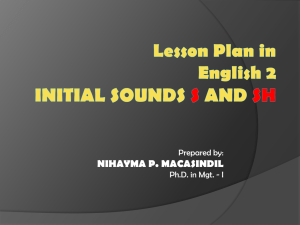
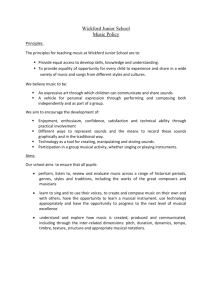
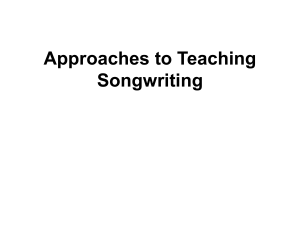

![afl_mat[1]](http://s2.studylib.net/store/data/005387843_1-8371eaaba182de7da429cb4369cd28fc-300x300.png)

